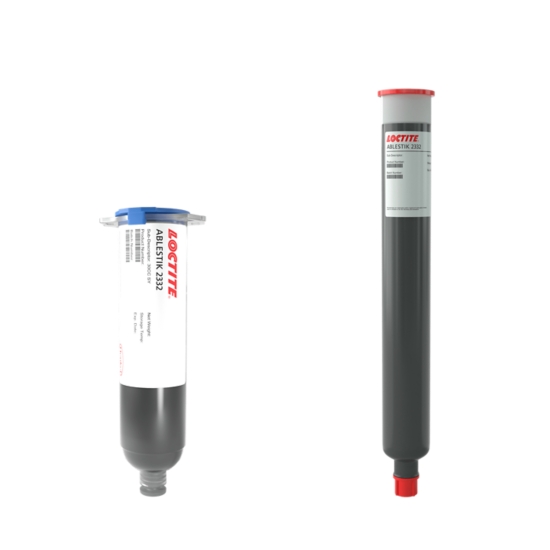LOCTITE ABLESTIK 2332
Harmonization Code : 3907.30.00.85 | Polyacetals, other polyethers and epoxide resins, in primary forms; polycarbonates, alkyd resins, polyallyl esters and other polyesters, in primary forms : Epoxide resins : Other
Main features
- One component
- Excellent adhesion
- High strength
Product Description
LOCTITE® ABLESTIK 2332 is a solventless epoxy adhesive that develops high bond strength when cured at temperatures as low as 100°C. This product combines toughness at low temperatures plus high peel and tensile shear strengths over a very broad temperature range
LOCTITE® ABLESTIK 2332 is a black, heat curing non conductive adhesive, ideal for Copper, Aluminum, Nickel, FRP surfaces and Rigid plastics. It is a universal adhesive that can be used, among others, for SMD components, caps and lids.
Cure Schedule
- 1 hour @ 120°C
- 90 minutes @ 100°C or
- 30 minutes @ 120°C or
- 20 minutes @ 150°C
Technical Specifications
| General Properties | |
| Specific Gravity Specific Gravity Specific gravity (SG) is the ratio of the density of a substance to the density of a reference substance; equivalently, it is the ratio of the mass of a substance to the mass of a reference substance for the same given volume. For liquids, the reference substance is almost always water (1), while for gases, it is air (1.18) at room temperature. Specific gravity is unitless. | 1.17 |
| Thermal Properties | |
| Glass Transition Temperature (Tg) Glass Transition Temperature (Tg) The glass transition temperature for organic adhesives is a temperature region where the polymers change from glassy and brittle to soft and rubbery. Increasing the temperature further continues the softening process as the viscosity drops too. Temperatures between the glass transition temperature and below the decomposition point of the adhesive are the best region for bonding. The glass-transition temperature Tg of a material characterizes the range of temperatures over which this glass transition occurs. | 105 °C |
| Physical Properties | |
| Viscosity Viscosity Viscosity is a measurement of a fluid’s resistance to flow. Viscosity is commonly measured in centiPoise (cP). One cP is defined as the viscosity of water and all other viscosities are derived from this base. MPa is another common unit with a 1:1 conversion to cP. A product like honey would have a much higher viscosity -around 10,000 cPs- compared to water. As a result, honey would flow much slower out of a tipped glass than water would. The viscosity of a material can be decreased with an increase in temperature in order to better suit an application | 70,000 mPa.s |



